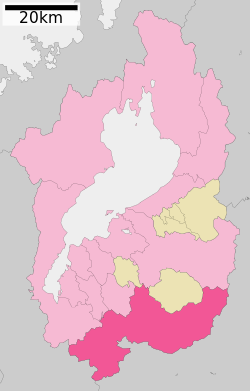Koga, Shiga
|
Kōka 甲賀市 |
||
|---|---|---|
| City | ||
|
||
 Location of Kōka in Shiga Prefecture |
||
| Location in Japan | ||
| Coordinates: 34°58′N 136°10′E / 34.967°N 136.167°ECoordinates: 34°58′N 136°10′E / 34.967°N 136.167°E | ||
| Country | Japan | |
| Region | Kansai | |
| Prefecture | Shiga Prefecture | |
| Government | ||
| • Mayor | Takeshi Nakajima | |
| Area | ||
| • Total | 481.69 km2 (185.98 sq mi) | |
| Population (October 1, 2016) | ||
| • Total | 89,881 | |
| • Density | 190/km2 (480/sq mi) | |
| Symbols | ||
| • Tree | Cryptomeria | |
| • Flower | Sasayuri (Lilium japonicum) | |
| • Bird | Common kingfisher | |
| Time zone | Japan Standard Time (UTC+9) | |
| City hall address | 6053, Minakuchichō Minakuchi, Kōka-shi, Shiga-ken 528-8502 |
|
| Website | www |
|
Kōka (甲賀市 Kōka-shi?) is a city located in southern Shiga Prefecture, Japan. (The word 'Kōka' is often rendered as 'Koga' in English, especially when referring to the Koga Ninja.)
As of October 2016, the city has an estimated population of 89,881 and a population density of 190 persons per km2. The total area is 481.69 km2.
The modern city of Kōka was established on October 1, 2004, from the merger of the former town of Kōka, absorbing the towns of Kōnan, Minakuchi, Shigaraki and Tsuchiyama (all from Kōka District).
Kōka is quite well known for its ninja history, fine quality ceramics and for containing two shukuba post stations (Tsuchiyama-juku and Minakuchi-juku) from the historic Tōkaidō. The city launched a new English version of their homepage in April 2007, and they have begun to actively promote themselves as a little-known, yet highly authentic, sightseeing destination.
Koka is served by local buses as well as two train lines.
Koka sits on the Kusatsu Line of the JR. The line runs from Kusatsu to Tsuge Station in Iga, Mie Prefecture. There are five stops in Koka - Kibukawa, Kōnan, Terashō, Kōka, and Aburahi.
...
Wikipedia


